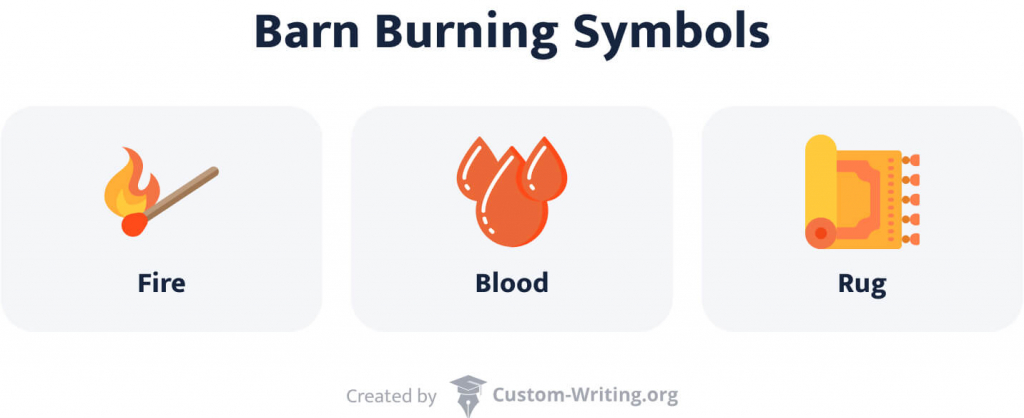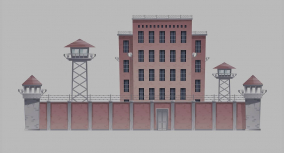In William Faulkner’s “Barn Burning”, symbolism helps the reader to understand deeper emotions and relationships in the story. In this article, we will focus on two of the most prominent symbols: fire and blood.
Main Symbols in Barn Burning
In William Faulkner’s “Barn Burning,” symbolism helps the reader understand the characters’ emotions and their relationships with one another. In this article, we will focus on three of the most prominent symbols: fire, blood, and the rug.

- Fire symbolizes Abner Snopes’s destructive anger and rebellion against authority. It also represents the man’s way of expressing frustration and seeking revenge.
- Blood is the symbol of family loyalty. In particular, Sarty Snopes’s internal conflict, as he has to deal with his father’s actions, emphasizes how blood relations can affect people’s lives.
- The rug symbolizes social inequality and Abner’s resentment towards the de Spain family. The destruction of the rug reflects the man’s defiance against a world that seems beyond his reach.
What Does Fire Symbolize in Barn Burning?
Fire is a key symbol in “Barn Burning.” It is also prevalent in Faulkner’s works and world literature in general. It is a symbol of civilization and, at the same time, of destruction. It can be used to warm the house or to burn and destroy. For instance, Abner Snopes uses the family’s oil lamp to burn Major de Spain’s barn. Symbolically, it can represent that he takes the source of light from the family to pursue his act of vengeance.
The duality of fire demonstrates a conflict in the Snopes family. Abner is entirely powerless, yet he is an authoritarian figure. He tries to dominate every member of his family, but he cannot wholly suppress Sarty’s growing sense of self. Abner treats everyone with coldness and a lack of respect. However, he is not impulsive. His acts of violence are well-calculated, and he rarely hits out of anger.
Interestingly, fire is the only way through which Abner asserts his independence. Even the fire Abner builds for his family when they camp is described as “shrewd.” His ability to control the size and strength of the fire demonstrates his desire to control his life. Indeed, fire is the only thing Abner has control of.
Quotes about Fire
He said, ‘He says to tell you wood and hay kin burn.’ I said, ‘What?’ ‘That whut he say to tell you,’ the nigger said. ‘Wood and hay kin burn.’ That night my barn burned. I got the stock out but I lost the barn.
Barn Burning, Mr. Harris
Older, the boy might have remarked this and wondered why not a big one; why should not a man who had not only seen the waste and extravagance of war, but who had in his blood an inherent voracious prodigality with material not his own, have burned everything in sight?
Barn Burning, Narrator
The element of fire spoke to some deep mainspring of his father’s being, as the element of steel or of powder spoke to other men, as the one weapon for the preservation of integrity.
Barn Burning, Narrator
Blood Symbolism in Barn Burning
Blood is another powerful symbol in “Barn Burning.” It is used repeatedly to demonstrate family ties and loyalty. At the beginning of the story, Sarty feels “the old fierce pull of blood.” It means that Sarty has a blood bond with his father, which is strong enough for the boy to lie for him. At this point in the story, the young boy still believes in the importance of blood ties and loyalty to them. Later in the story, Sartoris breaks these metaphorical ties even though it means having his father’s literal blood on his hands.
Interestingly, Abner Snopes is described as “bloodless.” This may hint at the fact that he himself doesn’t care about his own family. However, he wants everyone to protect him and lie for him.
Another episode in which blood appears happens right after the first court hearing. Some boy calls Abner a “barn burner,” and Sarty gets into a fight. He is bleeding but refuses to clean the red drops off his face. The literal blood in this episode represents Sarty’s loyalty to the family.
At the end of the story, Sarty frees himself from the blood ties, which causes death to Abner. Sarty prefers to stay loyal to his own sense of justice than to Abner. For Colonel Sartoris Snopes, truth ended up being more important than loyalty to his father.
Quotes about Blood
He aims for me to lie, he thought, again with that frantic grief and despair. And I will have to do hit.
Barn Burning, Sarty Snopes
Again he could not see, whirling; there was a face in a red haze, moonlike, bigger than the full moon, the owner of it half again his size, he leaping in the red haze toward the face, feeling no blow, feeling no shock when his head struck the earth, scrabbling up and leaping again, feeling no blow this time either and tasting no blood, scrabbling up to see the other boy in full flight and himself already leaping into pursuit as his father’s hand jerked him back, the harsh, cold voice speaking above him: “Go get in the wagon.”
Barn Burning, Narrator
You’re getting to be a man. You got to learn. You got to learn to stick to your own blood or you ain’t going to have any blood to stick to you. Do you think either of them, any man there this morning, would? Don’t you know all they wanted was a chance to get at me because they knew I had them beat? Eh?
Barn Burning, Abner Snopes
Barn Burning: Meaning of the Rug
The rug is another symbolic object in Faulkner’s short story. It becomes a symbol of the entrenched inequalities in Southern societies post-Civil War. Abner Snopes, resentful of the de Spain family’s prosperity, soils the expensive rug with horse manure.
This act signifies a critical shift, as it becomes the first time Snopes intrudes into the domestic sphere of the other family. This way, he expresses his disdain for their privileged position.
The rug, valued at a hundred dollars, represents the comfort and opportunities Snopes believes he has been denied. By destroying it, he renounces any regard for his family’s future and asserts his authority over those he sees as socially superior.
The symbolic destruction of the rug leads to legal consequences, revenge, and, ultimately, Snopes’s death. These events and their outcomes highlight the profound impact of socioeconomic disparities in the post-war South.
Now, you know all about the symbolism in “Barn Burning.” If you want to dig deeper into the story’s meaning, check out our list of essay topics and samples.











